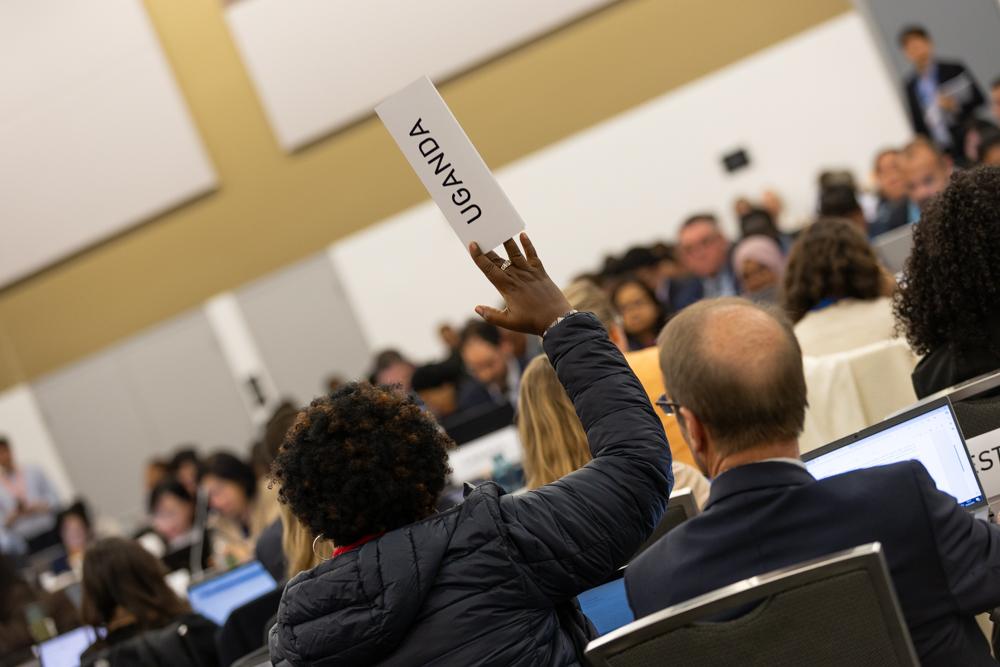
Delegates made opening remarks at the first day of the fourth United Nations Intergovernmental Negotiating Committee meeting in Canada. | Photo Courtesy of Earth Negotiations Bulletin
The first day of the fourth meeting to draft a global plastic pollution treaty started off with speed as delegates acknowledged the time crunch to get treaty text prepared.
According to the Earth Negotiations Bulletin, a division of the International Institute for Sustainable Development, delegates were “quick to acknowledge that the road towards a new treaty is steep, and, at least at this point, a heavy mist still obscures the route.”
“We have to get right down to work if we are to reach consensus before the year’s end,” one delegate noted, while another added that “this issue is too serious for us to stretch out these discussions. We know what we need to do by now, don’t we?”
Delegates are coming back together about five months after the third United Nations Intergovernmental Negotiating Committee meeting, which convened in Nairobi, Kenya, in November following two other meetings. The series was sparked by a 2022 vote on a U.N. resolution to create a legally binding agreement by the end of 2024.
After the past three meetings, countries have largely organized themselves into two camps: those who only want to manage plastic in the downstream area of the chain via recycling and a “high ambition” coalition that wants the treaty to address plastic fundamentally.
Earth Negotiations Bulletin writer Tallash Kantai said in an pre-meeting article that the High Ambition Coalition, chaired by Rwanda and Norway, is a group of 65 countries “interested in tackling the whole life cycle of plastic – not only plastics’ use and disposal, but also their creation.”
“These 65 countries want the instrument to address product design as well as what chemicals and harmful materials are added to plastics in their production,” Kantai said. “They’re also interested in holding companies accountable for the plastics they produce, a concept that’s called extended producer responsibility.”
She added that the stances of both the United States and China are unknown, though in the past the U.S. signaled it was interested in having each country create their own national action plans, closer to the first group of countries.
Countries take varied approaches
The meeting opened with general statements, and in line with the different groups, some delegates stressed the need to address the entire lifecycle of plastic, while others prioritized addressing only plastic waste management, Earth Negotiations Bulletin reported.
Taking a human rights-based approach to plastic pollution, specifically for waste pickers, also came up, as did the need to address the export of toxic plastic material: Ghana, on behalf of the African Group, said that Africa has been the “global hiding place for plastic waste.”
Samoa, on behalf of the Alliance of Small Island States, called for robust financial mechanisms and fast-track access to financial resources, technical assistance and capacity building.
Indonesia, speaking for the Coordinating Body On The Seas Of East Asia, emphasized that the treaty should be country-driven, eliminate plastic pollution under reasonable transition timelines and respect national circumstances, sovereignty and regional priorities.
On the first day, the INC established two contact groups that split off to keep working on sections of the draft text. The first, co-chaired by Palau and Germany, will look at the technical elements, while the second group, co-chaired by Australia and Ghana, will work on implementation measures.
Negotiators are ‘ready to work’
Before the meeting, many industry groups laid out their goals and worries about INC-4, and on April 21, Break Free From Plastic organized a march of hundreds of people to demand a human-rights based approach to the plastics treaty.
The Environmental Investigation Agency also released a modeling report that suggested greenhouse gas emissions due to plastics production could be halved over the next 25 years if a freeze and reduction in the production of plastic polymers were put into place globally.
Christina Dixon, Ocean Campaign Leader at Environmental Investigation Agency, said in a statement that “we urge countries to tackle the issue of plastic production head on and negotiate an instrument fit for purpose and fit for the future.”
In addition, the United Nations Environment Programme updated one of its official documents, an information reference for stakeholders, to note that it recognizes EPS transport packaging as a material that is recycled “in practice and at scale” in specific countries and regions, but not business-to-consumer formats of PS and EPS.
After the first day, Erin Simon, vice president and head of plastic waste and business for the World Wildlife Fund U.S. said in a statement that “Day 1 of INC-4 proved negotiators are ready to work.”
“By quickly shutting down delay tactics and moving swiftly into discussing the meat of the text, we’re already seeing the type of collaboration that is necessary to get us to the finish line,” Simon said.